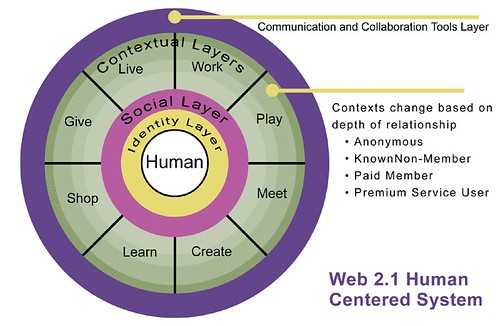Well, I spent the better part of the week just submerged in work, but Aaron Strout and Chris Saad are already syncing up on data portability, Mark Resch over at Cerado is hooking me up with some creative commons folks and the 4 Missions and 4 projects are clearly underway, not just in writing, but in action as well.
So since others are working, I figure I have to continue some momentum on stuff I’ve been hoping to work. I’ve done a fair amount of outreach with limited input, but the input/questions I’ve had were mainly general questions on what some of the standards are, so I thought I would let you know a little more about them, where I actually know something or at least understand via their website.
What is Creative Commons? Well, in their own words:
Creative Commons defines the spectrum of possibilities between full copyright — all rights reserved — and the public domain — no rights reserved. Our licenses help you keep your copyright while inviting certain uses of your work — a “some rights reserved” copyright.
In my words, it’s a way to share content and provide the RIGHT sourcing to provide the credit where credit is due. Social media has made access to content easier and represents an opportunity for chaos and CC looks to balance access and creative rights.
What is the Data Portability Project?
The DataPortability Project is a group created to promote the idea that individuals have control over their data by determining how they can use it and who can use it. This includes access to data that is under the control of another entity. Get a creative commons widget
What the heck are microformats?
Designed for humans first and machines second, microformats are a set of simple, open data formats built upon existing and widely adopted standards. Instead of throwing away what works today, microformats intend to solve simpler problems first by adapting to current behaviors and usage patterns (e.g. XHTML, blogging).
I suspect that explaination doesn’t really do it does it, now does it? (edit/update: that’s an awful lot of does its – clearly directionally correct, but needs a little work) I’m still not sure what microformats mean for the average person, but I know it’s important or it wouldn’t be on the list darn it. My sheer lack of understanding has made this the lowest priority. Trust me, I’ve tried to figure this out and even after going to the wiki I’m still stumped on the value prop. Since I would like to learn before I engage I’ve sent Ben Ward an email – will let you know, but basically microformats describe stuff, for humans first and machines second. I may have also found my way in another way… we’ll see.
One ID/Username might be cool – OpenID please.
OpenID eliminates the need for multiple usernames across different websites, simplifying your online experience.
You get to choose the OpenID Provider that best meets your needs and most importantly that you trust. At the same time, your OpenID can stay with you, no matter which Provider you move to.
Well, this is a new one which Chris added to the list, but definitely an important one, not sure how it has been overlooked until now, but better late than never. Even tho their mission seems a little lofty, looks like good stuff. Since it is new to the list and seems like an interesting agenda, the outreach is underway. Here is the basic high level overview:
The Open Web Foundation is an attempt to create a home for community-driven specifications. Following the open source model similar to the Apache Software Foundation, the foundation is aimed at building a lightweight framework to help communities deal with the legal requirements necessary to create successful and widely adopted specification.
Since there are definitely no shortage of opportunities to work on standards in the space, any other ideas let me know and I can bring it back to the group, or you could leave comments over at Social Media Club.
One of the other 4 projects is to expand media literacy and part of that comes through membership I would think. So looking to roll out an event in September 4 for Atlanta to start up again. We are finalizing the location, but tentatively it is at Tony’s on Holcomb Bridge in Roswell, other ideas are welcome as Sherry and I look to re-ignite the group with just a little help from others in Atlanta. Should have it solidified in the next week or so…


